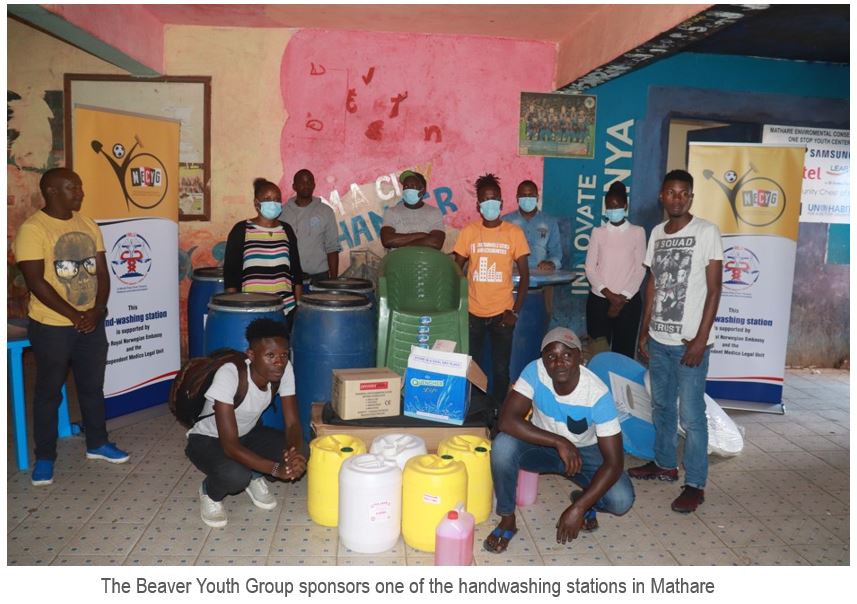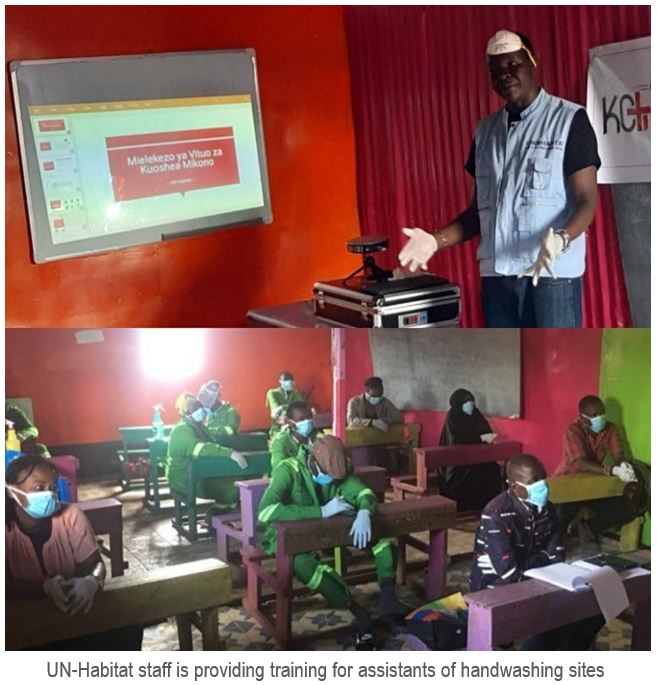The COVID-19 pandemic is significantly affecting the world’s most vulnerable groups, including the one billion people living in informal settlements and slums worldwide. These areas are densely populated with inadequate household water and sanitation, little or no waste management, overcrowded public transport, and limited access to formal health care facilities. The resulting danger to health is coupled with another significant threat faced by these people – the loss of livelihoods.
Under these circumstances, what do young people living in informal settlements and slums in Kenya have to endure? The International Labour Organization (ILO) estimates that in the 2nd quarter of 2020 working hours will decline by 6.7 per cent globally, which is equivalent to 195 million full-time workers. In Kenya, Africa’s seventh most populous country, the export and tourist industries are facing the brunt of the reduction in economic activity. In a country where 84 per cent of workers earn their living in the informal economy, according to the Kenya National Bureau of Statistics, the coronavirus containment measures such as curfew and lockdown cause additional hardships.
“Those who live hand to mouth are barely earning enough to feed their families each day, knowing that hunger may kill them before the coronavirus does” notes Issac Mwasa, a youth representative born and raised in Mathare slum and the chairman of Mathare Environmental One Stop Centre.
Besides the risk of unemployment and low-quality jobs, young people living in Mathare slum depend on limited savings while struggling to support their families. Those running a small business are experiencing a huge reduction in customers and income, leading to a higher risk of starvation, especially now as food prices are soaring, and indebtedness. Security issues may also put youth employment prospects in jeopardy. Kissmart Bakra, a core member of Nainami, a local youth-led NGO, predicts that “stealing, killing and other criminal acts will be common if the situation cannot be improved.”
As the pandemic advances, young people also face increased challenges in safeguarding their health and that of their families and communities. Considering that protective masks, sanitizers and even clean water for handwashing are often unavailable or unaffordable, young people must take extra steps to protect themselves.

As community activists, Isaac Mwasaand and Kissmart Bakra are motivated to improve the current situation and to protect the local community. Next to tapping into the creativity and potential of young people, they also rely on the ‘youth-led development’ methodology conceived through field practice by UN-Habitat. After the first confirmed coronavirus case in Kenya, Isaac Mwasa started to seek support from UN-Habitat, the Norwegian Embassy, and the Canadian High Commission for humanitarian assistance with a proposal to build handwashing sites in local villages. Today, 25 handwashing sites are serving, on average, 6,000 residents every day. “Most of the people who are washing their hands are young people. It is clear to us that youth will be central in making sure that the community carries out proper hygiene practices", Mr Mwasa observes.
Besides regular handwashing, the World Health Organization and other public health experts recommended social distancing and containment measures. These are particularly challenging in the slums, where private rooms are small and public spaces are crowded. To facilitate social distancing in the slum, Isaac Mwasa is working with local partners to produce and provide Mathare-made free face masks to the community, supporting the government’s efforts to enforce their use across the country.

Similarly, Kissmart Bakro, who before the country travel-lockdown took foreign tourists to visit Mathare to earn an income, continues working with other local youth activists to care for the community and raise awareness about the impact of the pandemic and ways to counteract the health and economic risks. He supports local women in the production of cloth face masks as a way to create job opportunities while protecting slum residents. They keep the community up to date through Skype and Zoom video calls as well as messaging through their smartphones.
Issac Mwasa and Kissmart Bakro are among the many youth representatives that have taken on leadership roles and made a positive change within their community in these trying times. Their work directly benefits those most severely affected by the pandemic and is also valued by the government of Kenya. Health Cabinet Secretary Mutahi Kegwe stated: “the youth should be at the centre of fighting these diseases. It is a journey that requires the energy of youth. I ask them to take up the responsibility like previous generations that fought for independence.”
This pandemic is a wake-up call for all and an invitation to join forces with young people to boost the resilience of informal settlements and slums. By working together and enabling inclusive, safe, resilient and sustainable cities and communities to thrive and prosper, the world can emerge stronger from this crisis and move closer to achieving the Sustainable Development Goals.
by Kui Cai (UN Volunteers, UN-HABITAT)
To learn more about UN-Habitat and the Mathare Environmental One Stop, please visit www.unhabitatyouth.org and follow @IsaacMuasa3, @MathareOne and @unhabitatyouth on Twitter.
This article is part of the Decent Jobs for Youth Blog Series: Youth Rights & Voices. The Blog Series highlights the impact of the COVID-19 pandemic on young women and men in the world of work and discusses action-oriented policy responses and solutions. If you would like to comment or contribute, please contact decentjobsforyouth@ilo.org.
To bring youth voices to the forefront of action and policy responses, the Global Initiative on Decent Jobs for Youth (DJY) and its partners are conducting a survey on the impact of the COVID-19 pandemic on youth rights. Participate in the survey now!
Article